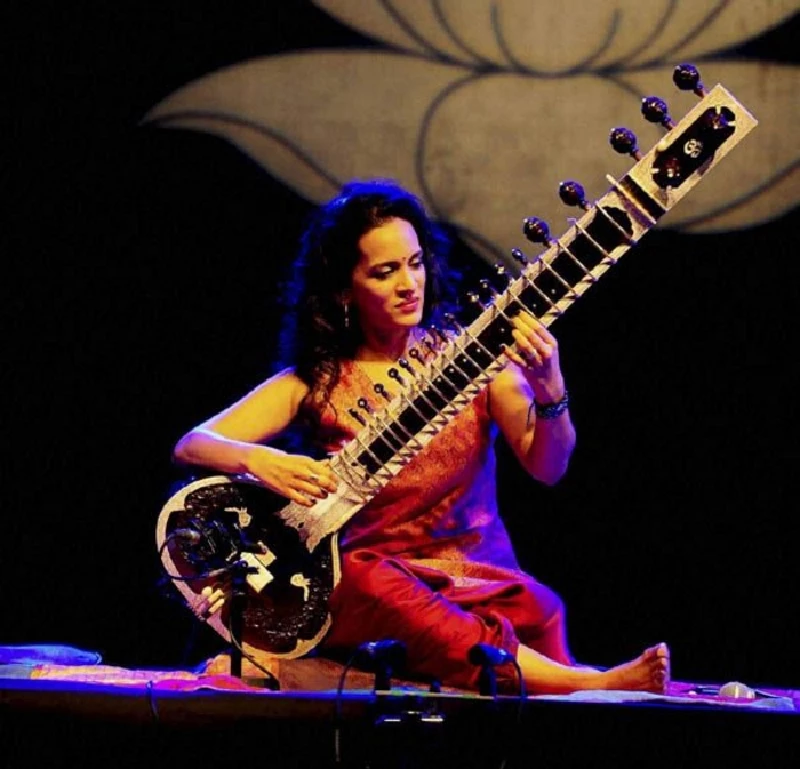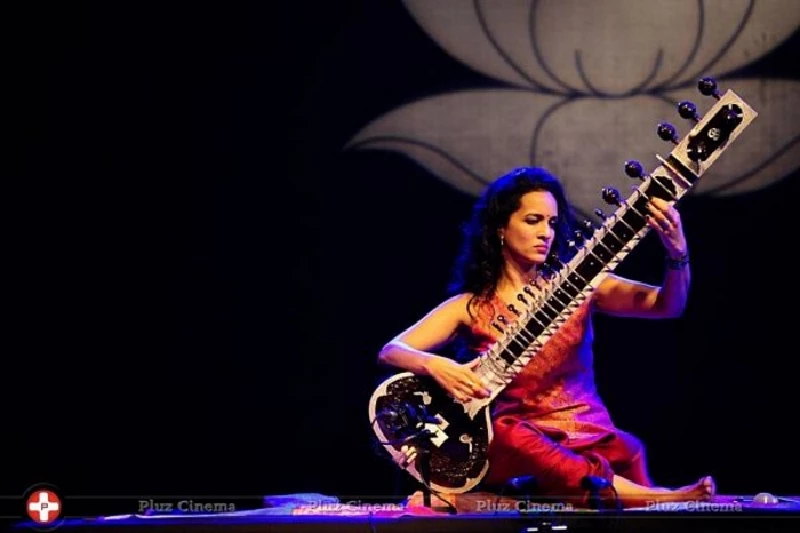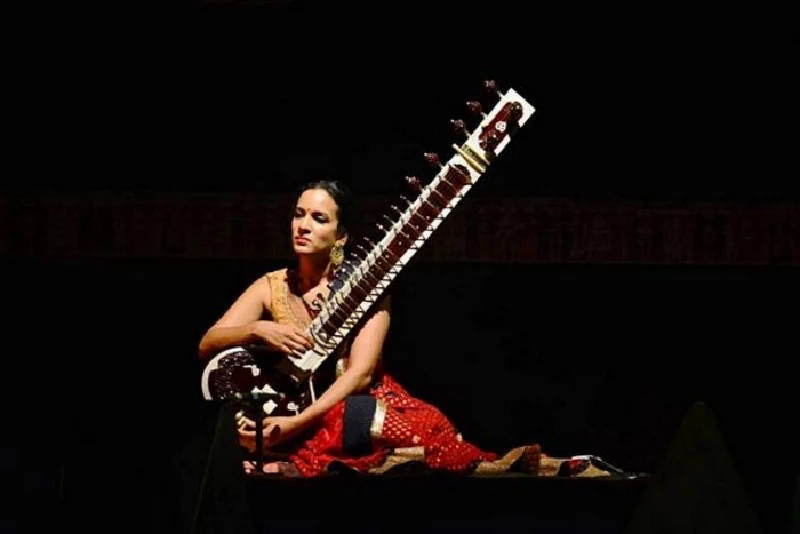Anoushka Shankar - Symphony Hall, Birmingham, 10/11/2016
by Owen Peters
published: 8 / 2 / 2017

intro
Owen Peters finds Indian musician Anoushka Shankar's sitar playing elating and heavenly at a gig to promote her new album 'The Land of Gold' at the Birmingham Symphony Hall
Pairings can offer pleasure, well-being and comfort. For some, it’s TV and wine, or wrapped up with a book and cup of tea, headphones and music, fresh air and walking boots. Personal preference, it’s a sitar with tabla or the ghatam as my favoured percussion accompaniment: bliss, do not disturb. Right place, right time, right mood, I can and have listened to Ravi Shankar all day. He has been my earworm guru as I've tentatively explored differing styles of the sitar and classical indian music. My knowledge is limited. My enjoyment is without boundaries. Since the passing of Ravi Shankar in December 2012, the legacy continues via his daughter, Anoushka Shankar. She began training with her father at the age of seven, performing with him on the tanpura at age ten, releasing her first album 'Anoushka' in 1998, along with two more albums under the banner of Indian classical music up to 2005. Signing for Deutsche Gramophon in 2011 signalled a period of creative activity in which she continued to define her own style of sitar playing and writing of musical compositions. On fourth album 'RISE,' released in 2005, she self-composed and self-produced, which offered a definitive statement on her style and development. She moved away from her standard classical training, offering a different composition of Indian music to new Western ears. Working with Nitin Sawhney, her half-sister Nora Jones, Joshua Bell, Sting, the Orpheus String Orchestra and the London Philharmonic Orchestra, she has gained a worldwide reputation as a talented sitar player and composer. But she also brings compassion to her music, stimulated by tragic, worldwide events. Her current album 'Land of Gold' produced by film director, husband, Joe Wight ('Pride and Prejudice', 'Atonement', 'Hanna') originated in the context of humanitarian rights, specifically the plight of refugees fleeing Syria. “It coincided with the time I had recently given birth to my second child,” she explains in the album's notes. The title track 'Land of Gold' is shaped by the heart-wrenching image seen worldwide of Aylan Kurdi, the Syrian infant washed up lifeless on a Turkish beach. She goes on to explain, “I felt overwhelmed with a sense of powerlessness to alleviate the suffering and injustice taking place as the world looked on." Shankar's current autumn tour flip flops between Bahrain, Warsaw, Vienna, Innsbruck and Zurich to Washington D.C., but includes just one date outside of London, here at Birmingham’s imposing Symphony Hall. The Symphony Hall exudes a sense of power and strength which flow over the auditorium's various tiers of seating. When Shankar takes to the stage, accompanied by co-writer and musical arranger Manu Delago on percussion and hang, Tom Farmer, on piano and double bass and Sanjeev Shankar (no relation) on shehnai, around half of the 2262 seats are taken. She is barefooted, dressed in a simple, sleeveless, red dress, looking such a diminutive figure set against the huge, black backdrop. The venue was designed with a reverberation chamber and an adjustable sound canopy which can be lowered and raised above the stage. What was open or closed on the night, I don’t know. Joni Mitchell makes me cry, Leonard Cohen whimsical, Chet Baker feel the need of a drink, but when Sanjeev Shankar’s shehnai rang out alongside Anoushka Shankar's sitar, to a deeply rooted agnostic, I concede there just may be a heaven. The acoustics were a sheer delight as notes seemed to hang, then swoop over the audience. At this point, a round of applause began. I wasn’t alone in feeling the experience. By the time Shankar introduced herself and the trio, explaining most of the music would be taken from the album, 'Land of Gold,' they were twenty five minutes into the set. For some audience members, they had decided the format and musical arrangement was not for them. Manu Delago is justifiably noted as one of the leading hang players in the world. His pace, timing and rhythm is mesmerizing. When he, however, takes to standard drums and an electronica beat box, there are overtones of hip hop in his arrangements. At times, his improvisation is a little overpowering. For the most part, his percussion style worked for me, but I can, however, understand why some of the audience traditionalists took flight. The legacy of her father’s sound still lingers. Dialogue with the audience was limited. One song dovetailed into another which allowed the audience to settle. Collectively the auditorium and stage quartet entered a shared zone, breathing as one. Some folks will have come along having seen/heard Anoushka Shankar perform on a recent edition of 'Later with Jools Holland'. Others, will already be part of her fan base through purchased CDs, YouTube, or streaming stations, so not surprisingly, the gathered throng was a mixed bag of curiosity and expectation. 'Dissolving Boundaries' along with the background radio announcement of a refugee story, sounded like the score to a movie. Easy on the ears, pleasant, but not particularly memorable. However... Nothing, zero, zilch, now can prepare you for the experience of hearing Shankar as she becomes a single entity with the sitar during her solo riffs. At the pinnacle of 'Crossing the Rubicon,' some people had their eyes closed, families were holding hands and others sat upright as if focused attention would bring the sound closer. You often hear the phrase of artists playing their instruments with “consummate ease.” The sitar doesn’t look easy to play, and positioning and concentration look to be key components, as she so aptly demonstrated. She played with enduring speed, fingers dancing up and down the fret board, again and again in the region of ten minutes. The rhythm became hypnotic, a trance-induced reverberation of sitar strings. A spiritual experience of calmness ensued. The evening closed off with an encore, a lullaby dedicated to her second child. There were no programmes on the night; no CDs or T-shirt sales, no autographs, no “Birmingham, we love you”. She came, she played around 95-minutes and bowed, offering smiles and thanks to the audience and was gone. There was a strange stillness in the atmosphere upon exiting the theatre. It was like leaving the cinema having seen 'Schindler's List'. There was an aura of, “I want to talk about it, but just can’t find the words right now.” I overheard one lady saying to her friend, "The last time I felt like that, so at one within myself, I was on a beach with sand inbetween my toes, attending a yoga class." Shankar has completed what may be thought to be an impossible task. She has retained a respectful note to her father and his traditional style on numerous albums, whilst taking the sitar to new audiences with her own inimitable compositions. The sitar is a wonderful instrument, certainly therapeutic to my ears. The sheer hours and dedication which must be required to play the instrument at this level of intensity can and will only be achieved by a few dedicated and talented souls, of which Anoushka Shankar is one. Namaskar. Note: If this above review has wetted your appetite for Indian music new and classical, can I point you in the follow directions? a) Sky Arts are showing many artists from the annual Darbar Festival filmed at the Royal Festival Hall. Along with interviews, and live sessions, there is also a good range of historical content of the origins and traditions of Indian classical music. b) Radio 3 offer a two and half-hour concert (plus interviews) from Leicester’s Peepul Centre. It features three UK-based artists: London-based Soumik Datta on sarod, Leicester’s own Roopa Panesar on sitar. With Shahbaz Hussain, from Rochdale, who is gaining respect as one of the country’s leading tabla players. Should time allow, I hope you enjoy the experience.
Band Links:-
http://www.anoushkashankar.com/https://www.facebook.com/AnoushkaShankar/
https://twitter.com/ShankarAnoushk
Picture Gallery:-


most viewed articles
current edition
Carl Ewens - David Bowie 1964 to 1982 On Track: Every Album, Every SongJohn McKay - Interview
Editorial - July 2025
Billie Eilish - O2 Arena, London, 10/7/2025
Hothouse Flowers - Photoscapes
Bathers - Photoscapes 2
Bathers - Photoscapes 1
Visor Fest - Valencia, Spain, 26/9/2025...27/9/2025
Cleo Laine - 1927-2025
Simian Life - Interview
previous editions
Heavenly - P.U.N.K. Girl EPBeautiful South - Ten Songs That Made Me Love...
Trudie Myerscough-Harris - Interview
Pixies - Ten Songs That Made Me Love...
Boomtown Rats - Ten Songs That Made Me Love....
Fall - Hex Enduction Hour
Sam Brown - Interview Part 2
Doris Brendel - Interview
Donovan - Ten Songs That Made Me Love...
Blues and Gospel Train - Manchester, 7th May 1964
most viewed reviews
current edition
Sick Man of Europe - The Sick Man of EuropeAmy Macdonald - Is This What You've Been Waiting For?
Phew, Erika Kobayashi,, Dieter Moebius - Radium Girls
Alice Cooper - The Revenge of Alice Cooper
Blueboy - 2
Lucy Spraggan - Other Sides of the Moon
Cynthia Erivo - I Forgive You
Davey Woodward - Mumbo in the Jumbo
Philip Jeays - Victoria
Bush - I Beat Loneliness
Pennyblackmusic Regular Contributors
Adrian Janes
Amanda J. Window
Andrew Twambley
Anthony Dhanendran
Benjamin Howarth
Cila Warncke
Daniel Cressey
Darren Aston
Dastardly
Dave Goodwin
Denzil Watson
Dominic B. Simpson
Eoghan Lyng
Fiona Hutchings
Harry Sherriff
Helen Tipping
Jamie Rowland
John Clarkson
Julie Cruickshank
Kimberly Bright
Lisa Torem
Maarten Schiethart